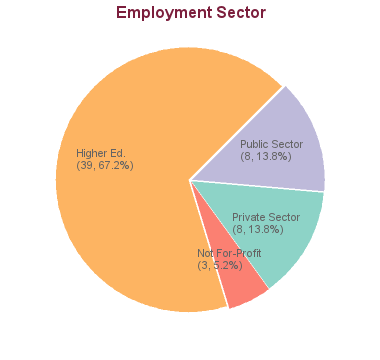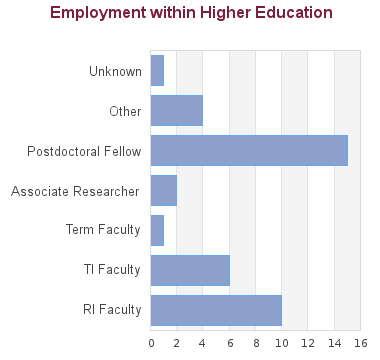Hannes Dempewolf
Job Title
Scientist and Project Manager
Employer
Global Crop Diversity Trust

Review details about the recently announced changes to study and work permits that apply to master’s and doctoral degree students. Read more
The Botany Department is one of the largest and strongest plant-focused departments in North America with roots extending back to the founding of UBC in 1915. Our departmental community of more than 260 consists of 40 full-time faculty members, several part-time faculty or associates, about 100 graduate students, numerous post-doctoral fellows and research associates, laboratory technicians, and a support staff of secretarial, equipment, herbarium, stores, workshop and greenhouse personnel. Our graduate students are expected to make influential contributions to scientific discovery and discourse, engage in formal and informal teaching and mentoring, and progress to careers in academia, industry, government and non-governmental organizations. The Botany Grad Student Association forms an active group, organizing talks, study sessions, field trips and a variety of social activities. Recent Botany graduates have gone on to prestigious postdoctoral and teaching/research positions in Canada, the USA and abroad (England, China, Taiwan, South Korea, Germany, France, Sweden).
The Botany Department offers unparalleled opportunities for research and teaching/learning with faculty members at the leading-edge of their disciplines. Specializations within Botany range from molecular genetics to climate change impacts on marine and terrestrial ecosystems. Collaborations between Botany faculty and other departments including Zoology, Chemistry, Forestry, Earth, Ocean and Atmospheric Sciences, and the Michael Smith Laboratories, bring a rich array of potential topic areas for research to Botany graduate students. State-of-the-art facilities for bio-imaging, as well as a world-class herbarium and access to living collections in the Canadian Centre for the Culture of Microorganisms, add to the overall uniqueness of the Botany program.
The Faculty of Graduate and Postdoctoral Studies establishes the minimum admission requirements common to all applicants, usually a minimum overall average in the B+ range (76% at UBC). The graduate program that you are applying to may have additional requirements. Please review the specific requirements for applicants with credentials from institutions in:
Each program may set higher academic minimum requirements. Please review the program website carefully to understand the program requirements. Meeting the minimum requirements does not guarantee admission as it is a competitive process.
Applicants from a university outside Canada in which English is not the primary language of instruction must provide results of an English language proficiency examination as part of their application. Tests must have been taken within the last 24 months at the time of submission of your application.
Minimum requirements for the two most common English language proficiency tests to apply to this program are listed below:
Overall score requirement: 92
Reading
22
Writing
22
Speaking
22
Listening
22
Overall score requirement: 6.5
Reading
6.0
Writing
6.0
Speaking
6.0
Listening
6.0
Some programs require additional test scores such as the Graduate Record Examination (GRE) or the Graduate Management Test (GMAT). The requirements for this program are:
The GRE is not required.
All applicants have to submit transcripts from all past post-secondary study. Document submission requirements depend on whether your institution of study is within Canada or outside of Canada.
A minimum of two references are required for application to graduate programs at UBC. Each graduate program determines the type of reference (e.g. academic, professional) and number of references they require which can range from 2 to 4. References should be requested from individuals who are prepared to provide a report on your qualifications for the program.
Many programs require a statement of interest, sometimes called a "statement of intent", "description of research interests" or something similar.
Students in research-based programs usually require a faculty member to function as their thesis supervisor. Please follow the instructions provided by each program whether applicants should contact faculty members.
Permanent Residents of Canada must provide a clear photocopy of both sides of the Permanent Resident card.
All applicants must complete an online application form and pay the application fee to be considered for admission to UBC.
| Fees | Canadian Citizen / Permanent Resident / Refugee / Diplomat | International |
|---|---|---|
| Application Fee | $116.25 | $168.25 |
| Tuition * | ||
| Installments per year | 3 | 3 |
| Tuition per installment | $1,875.34 | $3,294.66 |
| Tuition per year (plus annual increase, usually 2%-5%) | $5,626.02 | $9,883.98 |
| Int. Tuition Award (ITA) per year (if eligible) | $3,200.00 (-) | |
| Other Fees and Costs | ||
| Student Fees (yearly) | $1,144.10 (approx.) | |
| Costs of living | Estimate your costs of living with our interactive tool in order to start developing a financial plan for your graduate studies. | |
Applicants to UBC have access to a variety of funding options, including merit-based (i.e. based on your academic performance) and need-based (i.e. based on your financial situation) opportunities.
All full-time students who begin a UBC-Vancouver PhD program in Botany starting September 2024 will be provided with a funding package of at least $31,440 for each of the first four years of their PhD. The funding package may consist of any combination of internal or external awards, teaching-related work, research assistantships, and graduate academic assistantships. In addition to this stipend, PhD students will receive a tuition waiver for the first 4 years of their studies. To be considered for the tuition waiver, tuition must not be funded from other sources. Please note that all financial support is subject to satisfactory performance and annual review.
For further information, visit:
https://botany.ubc.ca/graduates/graduates-financial-support-info/
This results in a net balance (any funding provided to the student minus tuition and fees) mean of $27,491 and median of $30,498.
All applicants are encouraged to review the awards listing to identify potential opportunities to fund their graduate education. The database lists merit-based scholarships and awards and allows for filtering by various criteria, such as domestic vs. international or degree level.
Many professors are able to provide Research Assistantships (GRA) from their research grants to support full-time graduate students studying under their supervision. The duties constitute part of the student's graduate degree requirements. A Graduate Research Assistantship is considered a form of fellowship for a period of graduate study and is therefore not covered by a collective agreement. Stipends vary widely, and are dependent on the field of study and the type of research grant from which the assistantship is being funded.
Graduate programs may have Teaching Assistantships available for registered full-time graduate students. Full teaching assistantships involve 12 hours work per week in preparation, lecturing, or laboratory instruction although many graduate programs offer partial TA appointments at less than 12 hours per week. Teaching assistantship rates are set by collective bargaining between the University and the Teaching Assistants' Union.
Academic Assistantships are employment opportunities to perform work that is relevant to the university or to an individual faculty member, but not to support the student’s graduate research and thesis. Wages are considered regular earnings and when paid monthly, include vacation pay.
Canadian and US applicants may qualify for governmental loans to finance their studies. Please review eligibility and types of loans.
All students may be able to access private sector or bank loans.
Many foreign governments provide support to their citizens in pursuing education abroad. International applicants should check the various governmental resources in their home country, such as the Department of Education, for available scholarships.
The possibility to pursue work to supplement income may depend on the demands the program has on students. It should be carefully weighed if work leads to prolonged program durations or whether work placements can be meaningfully embedded into a program.
International students enrolled as full-time students with a valid study permit can work on campus for unlimited hours and work off-campus for no more than 24 hours a week during academic sessions.
A good starting point to explore student jobs is the UBC Work Learn program or a Co-Op placement.
Students with taxable income in Canada may be able to claim federal or provincial tax credits.
Canadian residents with RRSP accounts may be able to use the Lifelong Learning Plan (LLP) which allows students to withdraw amounts from their registered retirement savings plan (RRSPs) to finance full-time training or education for themselves or their partner.
Please review Filing taxes in Canada on the student services website for more information.
Applicants have access to the cost estimator to develop a financial plan that takes into account various income sources and expenses.
65 students graduated between 2005 and 2013: 1 graduate is seeking employment; 1 is in a non-salaried situation; for 5 we have no data (based on research conducted between Feb-May 2016). For the remaining 58 graduates:


Botany is the branch of biology that involves the study of the structure, evolution, properties and biochemical processes of all forms of plant life, including algae, fungi, ferns and trees. Also included within its scope are plant classification and the study of plant diseases, as well as the interactions of plants with people and the environment. A degree in Botany is well-suited to meet the challenges posed by biodiversity loss and impacts of climate change. Positions for people with botany backgrounds are usually in educational institutions, government and environmental organizations, and in the biotechnology industry including companies seeking new drugs and medicines, and useful genes for improvement of crop plants.
These statistics show data for the Doctor of Philosophy in Botany (PhD). Data are separated for each degree program combination. You may view data for other degree options in the respective program profile.
| 2023 | 2022 | 2021 | 2020 | 2019 | |
|---|---|---|---|---|---|
| Applications | 26 | 21 | 22 | 27 | 28 |
| Offers | 14 | 9 | 7 | 8 | 13 |
| New Enrolment | 13 | 7 | 5 | 6 | 8 |
| Total Enrolment | 68 | 61 | 57 | 61 | 63 |
Students in research-based programs usually require a faculty member to function as their thesis supervisor. Please follow the instructions provided by each program whether applicants should contact faculty members.
These videos contain some general advice from faculty across UBC on finding and reaching out to a supervisor. They are not program specific.
This list shows faculty members with full supervisory privileges who are affiliated with this program. It is not a comprehensive list of all potential supervisors as faculty from other programs or faculty members without full supervisory privileges can request approvals to supervise graduate students in this program.
Research in Botany extends from genomics, molecular genetics, biochemistry and physiology of plants and eukaryotic microorganisms (e.g., fungi and protists) through to cytology and development to systematics, ecology, and phytogeography. The broad areas of research possible within the program are cell biology and biochemistry; genomics and genetics, plant molecular biology; plant and algal physiology; terrestrial and marine ecology; biosystematics and evolution; development and ultrastructure; protistology; and mycology.
Departments/Programs may update graduate degree program details through the Faculty & Staff portal. To update contact details for application inquiries, please use this form.
